
What is a Dental Check-up?
A dental check-up is a routine examination performed by our expert dentist to assess your oral health. Regular check-ups are essential for maintaining good dental hygiene and preventing potential issues from becoming severe problems.
During these visits, Our dentist will evaluate your teeth, gums, and overall oral health, providing necessary treatments and recommendations to keep your smile healthy and bright.
You’ll Enjoy Our Expert Dental Cleaning Process
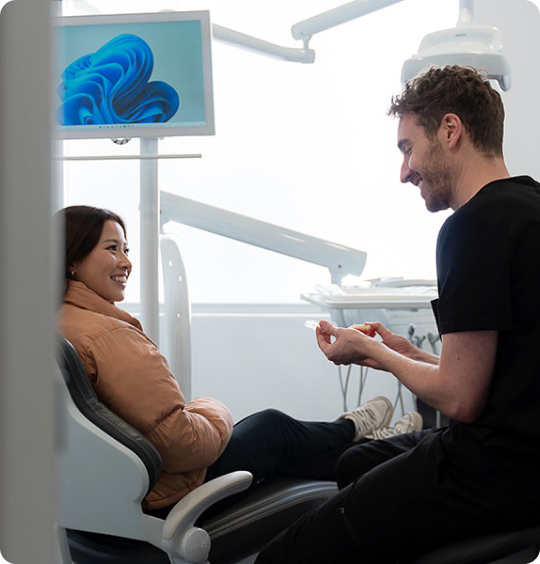
At 123 Dental, we conduct a comprehensive evaluation to ensure every aspect of your oral health is thoroughly assessed. Here are the key areas we focus on:
- Diagnostic X-ray Examinations: Detailed images to identify hidden dental issues.
- Tooth Examinations: Checking for cavities and other signs of decay and examining the condition of current fillings, crowns, and other restorations.
- Gum Disease and Oral Cancer Evaluations: Assessing the health of your gums to prevent and treat gum disease. Evaluating early detection of oral cancer signs and symptoms.
- TMJ (Jaw Joint) and Aesthetic Assessment: Checking for issues with your jaw joint and assessing any cosmetic concerns you may have about your smile.
- Orthodontic Assessment: Evaluating the alignment of your teeth and jaw.
- Oral Hygiene and Dietary Recommendations: Guiding on maintaining oral hygiene, whilst discussing the impact of your diet on your oral health.
Why Preventative Dental Care is Important
The aim of preventative dentistry is to ward off gum disease, cavities, tooth sensitivity, and other common dental issues. By preventing or reversing the early signs of these conditions, patients can maintain bright, healthy smiles for a lifetime.
- Save Money – Regular check-ups can help detect problems early, preventing the need for more extensive and expensive treatments later on.
- Better for Your Health – Maintaining good oral health is crucial for your overall health. Preventative care helps reduce the risk of serious health issues related to poor oral hygiene.
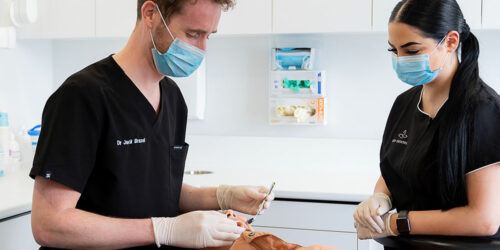
Book In Your Check Up Today!
Get in touch with our team today, we can get you booked in.
Meet Your Dentists

Dr. Jack Brazel
As Dr. Jack Brazel, I’ve been committed to your dental well-being for over ten years. With a degree in Dental Science from Leeds University, my main focus is on delivering outstanding Invisalign results in Perth.
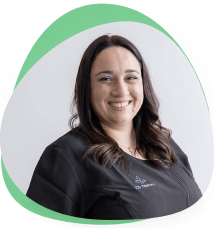
Dr. Deanne Anastasas
I’m Dr. Deanne Anastasas, a Perth native. With a Dental Science degree with Honours from UWA, I’ve spent years providing top-notch dental care in various clinics, with a special emphasis on Invisalign treatment, ensuring your smile is in expert hands.
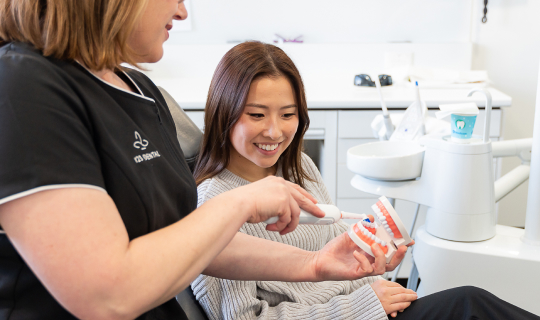
How Long Between Checkups?
For most people, it’s recommended to have a dental check-up every six months. However, depending on your specific oral health needs, your dentist may suggest more frequent visits. Regular check-ups are key to preventing dental issues and maintaining optimal oral health.
Checkups FAQs
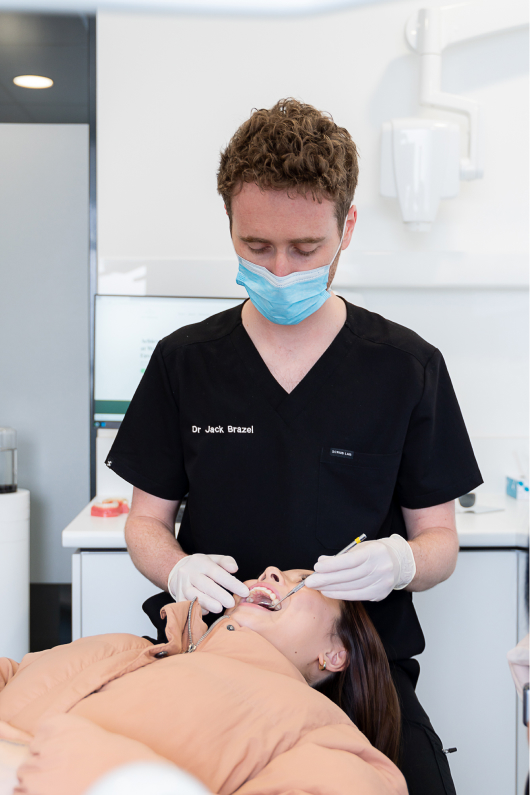
1. How Do You Prepare for a Dental Checkup?
If it is the first time that you have scheduled your adult dental exam, you should know what to expect. You will most likely be checked by the dentist or, in some cases, a hygienist. The exam will help evaluate your oral hygiene and the overall health of your mouth. If there is tooth decay or risk of diseases, such as gum disease, you will know about it during the day of your checkup.
It’s crucial that you reach out to us and tell us if you’re anxious about the dental examination. Share your concerns so that your dentist can adjust your treatment to your level of comfort, if possible.
2. Why Does the Dentist Need to Take X-rays?
Dentists are well-versed in the health of the teeth and the surrounding tissue. However, certain diseases cannot be detected with the naked eye, so X-rays are often utilised. The examination may reveal if you have small areas of decay below the fillings, bone infections, or the existence of a periodontal disease. X-rays can also help diagnose abscesses, certain types of tumours, and developmental abnormalities.
Detecting dental health problems at an early stage can help prevent costly and lengthy treatments. Additionally, if you have hidden tumours, the X-ray exam may potentially save your life.
3. Do You Still Need to Visit the Dentist Even If You're Wearing Full Dentures?
Many people think that dental appointments are just for checking and repairing natural teeth. When you have dentures, especially full dentures, you no longer have natural teeth. But that does not mean you should skip any visits to the dentist.
It’s true that dentures save you from dental decay. However, you could have issues associated with the oral appliance, such as frequent mouth sores. Your dentures may start feeling loose, as well. Appointments every six or 12 months are recommended for everyone, including those who wear dentures. Regular visits help avoid complications that could happen along the road.
4. Should You Visit the Dentist Even if Your Teeth Feel and Look Fine?
The short answer to this question is “Yes.” Your teeth can look clean and strong on the surface, but you may not be aware that there are problems that already exist. This is why it’s important to schedule regular appointments with your dentist.
The appearance of your teeth and your oral health are essential. Your dentist can make sure that you keep your smile looking beautiful even as you grow older. Misshapen, chipped, or stained teeth can be resolved in the chair within a few hours or even less. Additionally, dentists can help prevent potential issues from fully developing, such as tooth decay and periodontal disease.
5. What Can You Do While Waiting for Your Next Dental Checkup?
A vital step towards good oral health is to brush twice a day and floss at least once. Don’t forget about your tongue, too! The toothpaste you use should contain fluoride. If your dentist told you to use a fluoride rinse, make sure that you do so to help prevent cavities.
As much as possible, you should avoid eating foods that are high in sugar. This sweet substance easily increases bacteria in the mouth, which can lead to plaque and cavities. If you smoke, stop now since it can cause gum disease, stained teeth, and even increases oral cancer risk. Be sure that you schedule your checkup every six months.
6. Can a Dentist Help with Tooth Sensitivity?
If you feel pain whenever you eat hot or cold foods, it most likely means you have sensitive teeth. You may also feel the same sensation whenever you consume anything sweet or acidic. Your teeth become sensitive when the tooth enamel gets thinner. It’s often a result of repeated exposure to extreme temperatures and sometimes acidity.
If you have receding gums, fractured teeth, or you grind your teeth while you sleep, you could be experiencing sensitivity. And that’s a condition that dentists can help you with. The treatment will depend on the source or cause of the sensitivity.
7. Should Children Visit the Dentist?
Just like adults, children can also develop cavities. In fact, they have an increased likelihood, especially those who love sweets and with poor dental hygiene. Children can start getting cavities as early as two years old. That is why it’s recommended that you schedule a dental appointment for your child once the first tooth erupts.
Many parents introduce their kids to the dentist after their first birthday. These early visits can help detect potential problems that may impact the child’s oral and overall health. For more information, please read this blog post.
8. How Often Should You Book The Dentist?
Our expert dentists recommend that general dentistry (check ups and cleans) should occur every 6 months. The maximum amount of time between each visit should be 12 months.


